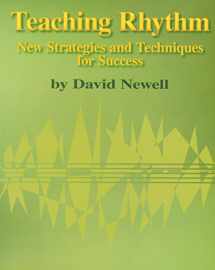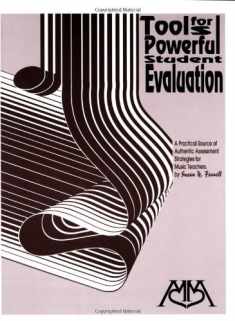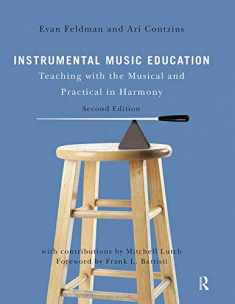
Teaching Rhythm: New Strategies and Techniques for Success
Book details
Summary
Description
Teaching Rhythm: New Strategies and Techniques for Success is a unique, innovative, and comprehensive textbook devoted exclusively to the teaching of rhythm. This book presents traditional, as well as non-traditional, 21st century, outside-the-box concepts, and strategies relative to the teaching of rhythm.
Part One: Presents a logical, student-centered, five-step Rhythm Learning Sequence for introducing students to the performance of rhythms, from sound to sight.
Part Two: A minutely detailed look at the author's philosophy of The Whole Note System, the theory upon which The Simple Rhythmatician (also by David Newell) is based.
Part Three: Discusses counting systems and their effective uses in the classroom.
Part Four: Takes a comprehensive look at Compound Meter and the ease with which it can be taught.
Part Five: Suggests a unique and creative way to introduce students to Irregular and Mixed Meters.
All music teachers -- whether band, orchestra, or choir directors; classroom music teachers; or private studio teachers -- must deal with the problems inherent in getting students to first perform and then to understand rhythms. Those who are the most efficient will have the most time to spend on things musical. Rhythmic independence is one of the most important skills for students to master. Rhythmic independence is the gateway to making music, and Teaching Rhythm: New Strategies and Techniques for Success will be an invaluable resource for all music educators!
Testimonials:
"David Newell has produced an impressive book that all music teachers need to read. Mr. Newell has made a lifelong study of teaching rhythm to young students. His suggestions and insights are invaluable at any level. His chapters on Teaching Compound Meter and Introducing Students to Irregular Meter are especially good."
- John W. Knight, Ph.D.
Professor of Conducting and Music Education
Oberlin College
"David Newell has done a remarkable job in presenting his system of rhythm education. His writing is extremely defined with personal experience backing up all the instructional techniques. All of the graphics support the text. Most impressive are the illustrations and complete instructional sequences. This publication will be a tremendous contribution to our profession."
- Edward S. Lisk
Author, Clinician, Conductor
"David Newell's textbook on teaching strategies for pulse, meter, and rhythm is a superlative resource for the music educator. The text is a thorough, creative, and effective treatise on teaching strategies for the single most important musical concept. He presents thoughtful concepts that challenge conventional practice in a convincing fashion. Without question, he substantiates his proposed methodology and makes the reader rethink his/her positions on teaching strategies. David's well-written document uses the perfect balance between formal and practical styles. This is a textbook that I will encourage all of my students to read. Bravo to you, David, for writing one of the best books on teaching music."
- Joseph Manfredo
Music Education Division
University of Illinois at Urbana-Champaign


We would LOVE it if you could help us and other readers by reviewing the book
Book review





